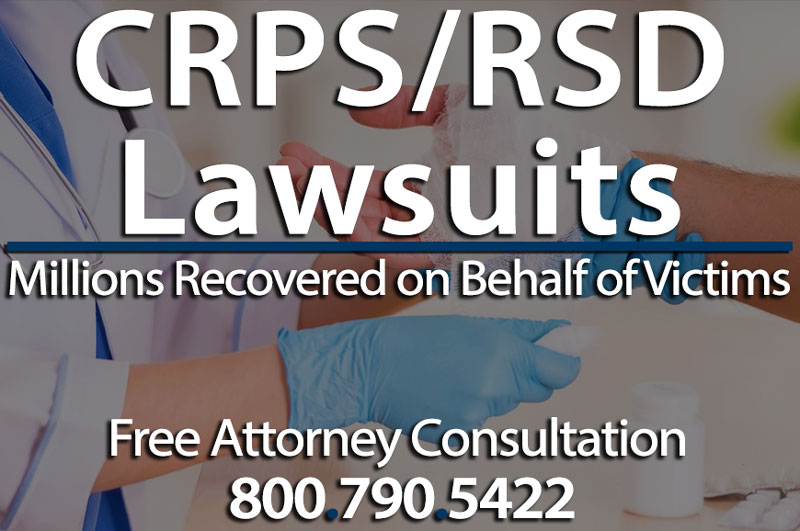
What Is CRPS And How To Diagnose
Complex Regional Pain Syndrome (CRPS), or once formerly known as Reflex Sympathetic Dystrophy, is a neuro-inflammatory disorder that attacks the Autonomic Nervous System and the Sympathetic Nervous System. CRPS causes a constant, incredibly intense pain that is often far more severe than the pain of the original injury. CRPS usually occurs within one or more of a person’s limbs, but it is recorded to occur in any part of the body and sometimes spreads to other areas. According to the McGill Pain Index, it is the most painful form of chronic pain that one can experience. If you or a loved one has been diagnosed with CRPS due to the negligence, misconduct, or violent intent of another you may require substantial legal counsel. Contact the top-rated Normandie Law Firm today and we can fit you with a team skilled attorneys with experience in CRPS cases that can ensure you receive the compensation you deserve for the pain and suffering endured.
Symptoms & Forms of CRPS
Symptoms of CRPS vary from victim to victim as they tend to arise at different phases of the disorder, or don’t appear at all depending on the case. Common symptoms of CRPS include:
- A deep, aching, cold, burning pain
- Increased skin sensitivity
- Allodynia Associated Pain (pain that comes from the touch of clothing or a shower)
- Continual Pain
- Hyperalgesia (a heightened sensitivity to pain)
- Swelling of the affected area
- Abnormal hair or nail growth
- Skin Discoloration
- Abnormal skin temperature
- Limited range of motor function
- General muscle weakness (paralysis and dystonia)
Symptoms of CRPS can vary wildly and sometimes cannot occur at all depending on the case. CRPS usually comes in two forms: Type 1 and Type 2. Type 1 takes place after an injury that inflicts the nerves of the affected limb indirectly. This is the most common form of CRPS as nearly 90% of all cases are Type 1. Type 2 Cases are often referred to as causalgia and are the least common form of CRPS. This form of CRPS occurs when there is direct damage to the nerves of an affected limb. There is a lot of mystery surrounding Type 2 CRPS injuries and proving its existence within medical negligence cases can be difficult. An expert lawyer with experience handling CRPS claims can help you pursue compensation.
Our Recent Verdicts and Settlements
$1.5 Million
$1.5 Million
$2 Million
$1.5 Million
$734,851
$600,000
Developing CRPS following a Spine Surgery
Many back injuries will require more than one surgery to repair them. This means that there can be a series of painful surgical procedures that will be performed, to help correct a back injury. Back and spin injuries disrupt the natural and normal balance of the spinal column. When there is an injury, the spinal cord can suffer damage that can lead to a permanent disability.
Back Surgery and Cervical Spine Surgery
If you have suffered an accident that has resulted in a spinal cord injury, you need to give our law office a call. We have attorneys on our team who are able to work with you to help you get the recovery compensation that you need in this type of case.
Failed Spinal Surgery
Any time that there is a trauma to the spine, it can cause a range of instability issues in the back. These instability issues can be in the form of:
- Asymptomatic cervical instability
- Development of arthritis
- Compression of the spinal cord
- Canal stenosis
Disc Replacement Fusion – Laminotomy
Some common complications that can occur with a disc replacement fusion include:
- Hydroelectrolytic imbalance
- Hip dislocation
- CHF
- Acute urinary retention
- Hernia recurrence
- Wound dehiscence
- Anemia
- Radicular pain
- Acute renal failure
- Headache
- Motor weakness
- Development of pulmonary embolisms
- Complications with the anesthesia during the spinal surgery
- Ictus cerebri
- Iliac vein lesion
- Hematoma
- Durotomy
- Urinary infection
- Deep wound infection
Spinal Surgeries Do Not Work Every Time
Spinal surgeries are not always successful. In fact, the success rate can be as low as only 60% successful. Some of the complications that can go wrong in a spinal surgery include:
- Breakage of screws, rods or hardware used to fuse the spine
- Loose screws or rods in the spine
- Stiffening of the spinal region
- Prior disc degeneration of the spinal region
- Instability of the spinal region
- Nerve compressions in the spinal region
- Error in preoperative assessment of spinal injury and care measurements
- Surgical error and complications
- Dural tears
- Overexposed spinal scar tissue
- Nerve root injury
- Infection
Disc Replacement Fusion – Laminotomy
After an accident, the spine may be seriously affected causing high pain levels in the person who suffered the loss. An artificial disc replacement fusion (ADR), total disc replacement (TDR) and a spinal fusion are the surgeries that will be recommended to help get the person back to being able to perform normal daily functions again. The surgeries of ADR, TDR and spinal fusion are performed by a surgeon to help restore function, relieve pain, and prevent a permanent disability for the individual suffering from this diagnosis. The surgical procedure used for the spinal fusion will use pedicle screws to support the bone as it heals, bone grafts from the person injured or extenders are often used to help the bone area too as it starts the healing process.

Causes and Treatment of CRPS
Victims are typically diagnosed with CRPS after a forceful trauma inflicted on a limb. This usually involves crush injuries like a bone fracture or amputation. Other forms of trauma that cause CRPS include surgery, heart attacks, infections, and even sprained ankles. It is still not entirely clear as to why these injuries trigger CRPS, but the common belief is that it may be due to a malfunction in the interaction between the central and peripheral nervous systems.
Treatment of CRPS is often expensive, time-consuming, and will not always find positive results. Currently, there is no cure for CRPS, and while the treatments can lessen the pain for some, the results may be inconclusive for others. An early diagnosis of CRPS however, can lead to a better outcome. The only problem is that diagnosis of CRPS is challenging to catch early. This is because there still lacks a consensus on the nature of CRPS within the medical community. Within cases of late diagnosed CRPS, physicians are doubtful of the validity of the patient’s pain. Although, if caught early, proper treatments can be administered that may lead to a lessening of the pain experienced by victims. One of our experienced lawyers can recommend doctors and treatments. Some of the treatments for CRPS include:
- Sympathetic Nerve Block: Victims who have undergone the sympathetic nerve block procedure, have reported temporary relief from pain. However, there is no record of a long-term relief of pain. This procedure involves the injection of an anesthetic next to the spine which directly blocks the misfiring nerves and improves blood flow to the area.
- Surgical Sympathectomy: This procedure includes the destruction of the problematic nerves afflicted by CRPS. Some medical experts believe that this form of treatment only makes CRPS symptoms worse, whereas others have reported favorable outcomes.
- Spinal Cord Stimulation: This procedure involves the stimulation of the spinal cord, through the injection of electrodes. This treatment provides a tingling sensation to the affected area and can lessen the victim’s pain. However, roughly 25% of those who undergo Spinal Cord Stimulation develop equipment problems and may require additional procedures.
- Intrathecal Drug Pumps: This method involves the pumping of pain-relieving drugs directly into the spinal fluid. These drugs are usually, opioids, anesthetic agents, clonidine, or baclofen. However, studies of this method have shown that there is not a significant benefit to recover from CRPS.
As well as these popular treatments for CRPS, there are a number of emerging treatments that are under development and study. We recommend that you consult a medical professional before proceeding with any one specific medical treatment. Additionally, it is wise to seek advice from a qualified lawyer experienced in CRPS cases.
Contact Our Firm
If you or a loved one has been diagnosed with CRPS as the result of the negligence, misconduct, or violent intent of another, our top legal team at Normandie Law Firm can fit you with an experienced attorney to ensure you receive the compensation that you deserve. As a commitment to you and your case, our firm operates under a zero fee guarantee policy. It is our belief that you should not have to pay any fees for our services until we win your case. An attorney who has experience in CRPS claims can tell you more about our policies.
If you feel as though you are in need of a second opinion, our firm offers a zero fee guarantee for second opinion case reviews. So please, feel free to give us a call for your free consultation with an accomplished attorney with expertise in CRPS injury lawsuits.
OUR ATTORNEYS CAN HELP YOU FILE A LAWSUIT FOR YOUR CRPS
What is Complex Regional Pain Syndrome? How to Diagnose CRPS?
Nerve Damage Medical Malpractice Attorney
File a Lawsuit for Your CRPS Ankle Injury After a Car Accident











